PhD Diet Whey Review 2024: Does It Burn Fat & Build Lean Muscle?
All articles are produced independently. When you click our links for purchasing products, we earn an affiliate commission. Learn more about how we earn revenue by reading our advertise disclaimer.
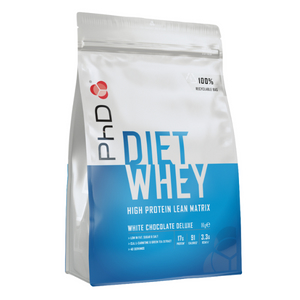
9.4
Quality
8.2
Support Research
9.0
Reputation
9.0
Price
Features
- Provides a blend of protein sources.
- Nutritionally tested by ALS Analytical Testing Services.
- Informed Choice tested.
- Comes in 10 flavours.
- Includes ingredients proven to aid weight loss.
- Provides healthy fats from flaxseeds.
Brand Information
- Founded in 2005.
- Founded by Jason Rickaby & Mark Bowering.
- UK-based company.
- Made by PhD Nutrition Limited.
Medical Benefits
- Might suppress appetite.
- Helps build muscle mass.
- Might increase fat burning.
- Promotes post-exercise recovery.
- Might slow brain aging.
- Might improve symptoms of depression.
About The Brand
If you’re looking for the best supplement to build muscle and lose body fat, PhD Diet Whey protein powder might be a good choice.
PhD Diet Whey is a protein powder made by the UK-based company, PhD Nutrition Limited, a division of Science in Sport PLC. PhD was founded in 2005 by Jason Rickaby and Mark Bowering.
But with mixed customer reviews, is this the right supplement for you? Our PhD Diet Whey review covers the pros, cons, potential benefits, and side effects.
What Is PhD Diet Whey Protein?
Weight loss usually comes at a cost: not only do you lose fat, but you also risk losing muscle mass. That’s where PhD Diet Whey comes in. This protein powder is designed to fill you up while delivering plenty of protein so you lose fat without losing muscle.
PhD Diet Whey protein comes in many flavours: White Chocolate, Belgian Chocolate, Salted Caramel, Chocolate Peanut, Vanilla Creme, Banana, Cookies & Cream, Chocolate Mint, White Chocolate & Raspberry, and Strawberry. At only £24.99 for one kilogram – working out at 62 pence per 25-gram scoop – it’s pretty cheap, too.
But does it really work? This PhD protein review article goes into the details to find out.
Feature Product & Coupon

Best Reputation
PhD Diet Whey Protein
- Provides a blend of protein sources.
- Nutritionally tested by ALS Analytical Testing Services.
- Informed Choice tested.
- Comes in 10 flavours.
- Includes ingredients proven to aid weight loss.
- Provides healthy fats from flaxseeds.
Does PhD Diet Whey Really Work?
PhD claims that its Diet Whey protein powder helps you lose weight with “fat-burning ingredients such as L-carnitine, CLA, and green tea extract to support your fat loss and lean muscle goals.”
Their protein blend combines protein sources with different digestibilities and is designed to offer a steady ‘drip’ of amino acids over a few hours. Theoretically, this should improve muscle adaptations to exercise while keeping you satisfied.
Many customer reviews agree that this protein powder is thick and filling, and there’s evidence to suggest that some of the ingredients can increase fat burning, too. But the concentration of ingredients might be too low to have a significant impact and, in the absence of results reported from third-party testing, it’s hard to recommend PhD Diet Whey as a premium protein powder to lose weight.
Pros
- Might suppress appetite.
- Helps build muscle mass.
- Might increase fat burning.
- Informed Choice tested.
- Nutritionally tested by a third party, ALS.
Cons
- Might cause gastrointestinal symptoms.
- Not suitable for vegans.
- Not suitable for those intolerant to lactose.
- Contains glucose and sucralose.
PhD Diet Whey Ingredients
PhD Diet Whey’s ingredients have been shown in studies to improve muscle growth, stimulate fat burning, and increase feelings of satiety.
We like that they combine protein from sources with different digestibilities — whey, milk protein, and soya protein — to create a protein powder supplement with a superior amino acid profile delivered over a longer window of time.
PhD Diet Whey seems cheap compared to other protein powders but, with only 17 grams of protein per scoop, you might need multiple scoops per day to support your physical activity.
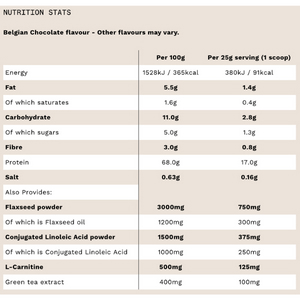
PhD Premium Protein Blend
PhD Whey Protein supplement provides 17 grams of total protein per 25-gram portion. The PhD premium protein blend combines proteins from
- Whey protein concentrate.
- Soya protein isolate.
- Milk protein concentrate, of which 80% is micellar casein.
PhD claims that providing protein derived from multiple sources varies the protein release into the bloodstream at different stages, giving you that “drip feed effect” of amino acids.
Studies show that whey protein concentrate is rapidly digested,[1] in 30-90 minutes, which is why it’s used post-exercise. Milk protein or casein can take up to seven hours to be fully absorbed and is recommended to prevent muscle breakdown long-term.
PhD Whey Protein also provides 3332 milligrams, or 3.3 grams, of total BCAAs — otherwise known as branched-chain amino acids — per 25-gram portion. The BCAAs valine, leucine, and isoleucine are three of the most important essential amino acids for muscle growth.[2]
Flaxseed Powder
PhD claims their golden brown flaxseed powder can support fat loss. Flaxseed is high in protein[3] and studies suggest that regularly eating flaxseed can protect heart health[4] and promote weight loss.[5]
One way flaxseeds seem to promote weight loss is by producing “mucilage” — a thick, gluey substance found in soluble fiber. Studies suggest flaxseed mucilage can trigger significant weight loss[6] while supplementing soluble fiber in general leads to weight loss and reduced waist circumference.[7]
The mucilage might also be the reason some customers say this protein powder makes a thicker shake than its competitors.
PhD Diet Whey provides 750 milligrams of flaxseed powder per 25-gram portion.
Conjugated Linoleic Acid
Conjugated linoleic acid, or CLA, is thought to stimulate muscle protein synthesis, but does the most recent evidence back up these claims?
Unfortunately, no. Studies found that 4000 milligrams of CLA per day for eight weeks had no effect on muscle synthesis rates[8] — at least, not in sedentary adults.
But other studies show that CLA might reduce muscle oxidative damage,[9] meaning it could reduce the amount of muscle that needs to be repaired following exercise-induced muscle damage.
However, PhD Whey Protein only provides 375 milligrams of CLA per 25-gram dose, which is less than the dose used in most studies, around four grams per day, so it might not be enough to have any significant effects on muscle.
The CLA in PhD Whey Protein comes in a powder from safflower oil. To turn the oil into a palatable, stable powder, it’s combined with several other ingredients: glucose syrup, milk protein, soya lecithin, and vitamin E.
L-Carnitine
L-carnitine is a non-essential nutrient proposed to improve sports performance and trigger weight loss. Studies show that supplementing L-carnitine increases arginine levels[10] and can improve sports performance such as cycling speed[11] and weightlifting performance.[12]
Other studies suggest that L-carnitine significantly triggers weight loss[13] and fat mass loss — although without changes in waist circumference or body fat percentage.
However, this last study found that 2000 milligrams, i.e., two grams, of L-carnitine per day provided the maximum weight loss benefits in adults; yet, PhD Diet Whey only provides 125 milligrams of L-carnitine per dose.
Green Tea Extract
Studies show that green tea extract can increase the amount of body fat you burn.[14] The catch? You can’t just consume green tea and hope to lose weight without doing any exercise because green tea only increases fat burning while you exercise.
Amazingly, it’s not to do with the caffeine in green tea. Studies show that even decaffeinated green tea extract significantly increases fat burning[15] during exercise, as well as increasing exercise intensity by 22.5 percent.
However, the above studies used doses of 400-1200 milligrams of green tea extract per day, while PhD Diet Whey contains 100 milligrams of green tea extract per 25-gram portion.
Other Ingredients
The other ingredients in PhD Diet Whey depend on the flavour, but all flavours contain
- Waxy barley flour.
- Reduced fat cocoa powder.
- Thickeners (acacia gum, guar gum, and xanthan gum).
- Flavouring.
- Sucralose.
Alternatives To PhD Nutrition
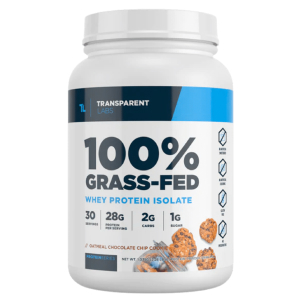
Transparent Labs
- Third-party lab tested.
- Precise amounts of each ingredient.
- Most ingredients are linked to published research.
- Not caffeine-free.
- Not as affordable as other supplements on the market.
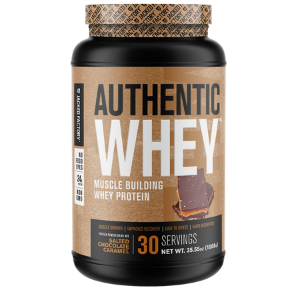
Jacked Factory
- Supports fat loss and lean muscle gains.
- Includes creatine.
- Made in the USA.
- Contains artificial flavours.
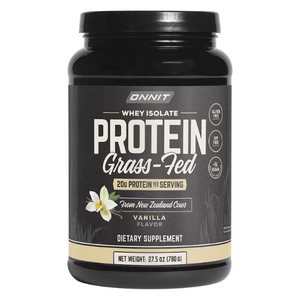
Onnit
- Whey comes from grass-fed cows.
- No added sugar.
- Protein only comes from whey.
- More expensive per gram of protein.
- Contains refined fats and oils.
Health Benefits Of PhD Diet Whey
Increased Muscle Mass
Protein helps build muscle. The optimal amount of protein to consume to increase lean body mass[16] is up to 1.6 grams of protein per kilogram of body weight — or even more than that for young people doing resistance training.
That means if you weigh 70 kilograms and you’re planning on getting all your protein from PhD Diet Whey, you’d need to consume 6.5 scoops a day to get 1.6 grams of protein per kilogram body weight, i.e., 112 grams of protein.
The high leucine[17] content of whey is the reason it’s considered the best type of protein for building muscle.[18] However, remember that protein supplementation only works for increasing muscle mass if you exercise enough[19] and if you’re getting enough nutrients from a balanced diet.
Increased Satiety
Protein also supports weight loss by increasing feelings of fullness, triggering the release of satiety-inducing hormones, and increasing thermogenesis.
Some studies suggest that whey protein — being a “fast” protein — is more satiating in the short term,[20] while casein — being a “slow” protein — is more satiating in the long term. Other studies show that whey is better at suppressing hunger[21] than soy protein or casein when consumed at ten percent of total calorie intake.
Finally, whey increases active Glucagon-like Peptide 1 in the brain, a hormone that controls appetite,[22] more than casein or soy.
Fat Mass Loss
Studies show that whey protein can trigger body fat loss[23] in those who do regular physical activity. If you do resistance training, studies suggest that whey protein powder can help you lose belly fat,[24] too.
Provides A Blend Of Protein Sources
Studies show that blending animal and plant proteins[25] optimizes the amino acid profile compared to individual proteins. Animal-based proteins provide more of the amino acids leucine and methionine, while plant-based protein sources provide more arginine.
What’s more, the rate of muscle protein synthesis peaks at different times[1] depending on the protein source. Peak muscle synthesis is at 60 minutes after whey protein ingestion, 90 minutes after milk protein, and a full two hours after casein consumption.
Speeds Up Post-Exercise Recovery
Inflammation slows muscle regeneration,[26] so the anti-inflammatory properties of CLA and green tea extract might help optimize muscle repair post-exercise.
Supplementing protein has also been shown to activate muscle stem cells,[27] which help repair muscle after exercise. Whey protein powder especially increases the concentration of “muscle satellite cells”[16] in muscle tissue — muscle cells “on standby” to repair damaged muscle in response to injury.
In addition, CLA has been shown to enhance glycogen resynthesis rates[28] after exercise. As restoring muscle glycogen stores[29] as quickly as possible is crucial for athletes to speed up recovery times, CLA could help you recover faster.
However, the participants in this study consumed 3.8 grams of CLA every day for eight weeks, while PhD Diet Whey protein only provides 375 milligrams of CLA per 25-gram dose.
Potential Side Effects
Gastrointestinal Symptoms
As whey contains lactose, a sugar in milk, whey protein supplements can cause digestive symptoms in those with lactose intolerance.[30]
Allergic Reaction
Some people have an allergy to casein or whey,[31] which can cause significant gas, bloating, and diarrhea if consumed.
Kidney Damage
A high-protein diet makes your kidneys work harder.[32] This should be fine in healthy adults with normal kidney function but might accelerate kidney function decline[33] in those with mild renal insufficiency or bodybuilders[34] who consume high amounts of protein for long periods of time.
Dosage
PhD Whey Protein Powder can be used at any time. PhD recommends using it in smoothies for breakfast or in between meals to increase feelings of fullness.
For optimal muscle adaptation, consume protein powder up to two hours post-exercise[35] and every three to four hours throughout the day.
Should You Take PhD Diet Whey Before Bed?
Taking a protein supplement before going to sleep might increase muscle protein synthesis throughout the night.[35]
Supplementing 40 grams of protein after resistance training and before bed might increase calories burned overnight[36] and increase feelings of fullness in the morning. Some studies suggest that consuming whey protein powder before bed[37] can increase muscle strength similarly to consuming it in the morning.
However, a recent 2021 systematic review found “limited to no effect” of supplementing milk protein before bed[38] on muscle adaptation, metabolism, or appetite in the absence of resistance training.
PhD Diet Whey Protein Review: What Do Real Users Say?
It sounds like there’s lots of evidence for the benefits of PhD Diet Whey, but do real users agree?
With 5 stars from more than 3,000 reviews on their own website and 4.5 stars from over 3,000 reviews on Amazon, you can’t go far wrong. Here are some real-world PhD Diet Whey reviews from real customers on phd.com and amazon.co.uk.
4/5 stars
Seeing how quick it is to make this protein shake tonight and how filling it is, this is now my new breakfast!
Tynesha
3/5 stars
It’s not as tasty as I was hoping, and has a gritty texture. I prefer it with a milk substitute as that makes it just about bearable. Don’t look forward to it really, but if you need protein then give it a go.
Miss Kitson
5/5 stars
Really yummy and filling. I drink it around 1PM, usually by the time i start to feel hungry. I wont feel my hunger till about 2:30PM.
Laurice Matar
Final Thought
Our PhD Diet Whey review found that this protein powder might be a good choice for active individuals looking to lose body fat while gaining muscle mass.
We especially like the blend of protein sources to promote muscle repair directly post-exercise and reduce muscle breakdown overnight.
However, this is probably not the best supplement for you if you don’t do much physical activity as many of the ingredients only show effects on muscle gains and fat loss when combined with exercise.
Moreover, if you’re only having one scoop per day, many of the non-protein ingredients might not be provided in a high enough concentration to have a noticeable impact on body fat loss. Nevertheless, many customers say that this protein powder was able to curb their hunger effectively.
Frequently Asked Questions
Reducing hunger and promoting muscle building.
Any time of day, but PhD recommends drinking it for breakfast or in between meals.
Yes, but only for one meal per day as it doesn’t contain essential micronutrients.
Yes, PhD Diet Whey can be mixed with milk to make a shake or smoothie.
PhD Diet Whey provides green tea extract, which might contain some caffeine.
Yes, among them, sucralose, an artificial sweetener, and what PhD labels as “flavourings,” without qualification.
+ 38 sources
Health Canal avoids using tertiary references. We have strict sourcing guidelines and rely on peer-reviewed studies, academic researches from medical associations and institutions. To ensure the accuracy of articles in Health Canal, you can read more about the editorial process here
- Kanda, A., Nakayama, K., Sanbongi, C., Nagata, M., Ikegami, S. and Itoh, H. (2016). Effects of Whey, Caseinate, or Milk Protein Ingestion on Muscle Protein Synthesis after Exercise. Nutrients, [online] 8(6), p.339. doi:10.3390/nu8060339.
- Vitale, K. and Getzin, A. (2019). Nutrition and Supplement Update for the Endurance Athlete: Review and Recommendations. Nutrients, [online] 11(6), p.1289. doi:10.3390/nu11061289.
- Logarušić, M., Radošević, K., Bis, A., Panić, M., Slivac, I. and Gaurina Srček, V. (2020). Biological Potential of Flaxseed Protein Hydrolysates Obtained by Different Proteases. Plant Foods for Human Nutrition, [online] 75(4), pp.518–524. doi:10.1007/s11130-020-00841-z.
- Parikh, M., Netticadan, T. and Pierce, G.N. (2018). Flaxseed: its bioactive components and their cardiovascular benefits. American Journal of Physiology-Heart and Circulatory Physiology, [online] 314(2), pp.H146–H159. doi:10.1152/ajpheart.00400.2017.
- Ahmadniay motlagh, H., Aalipanah, E., Mazidi, M. and Faghih, S. (2021). Effect of flaxseed consumption on central obesity, serum lipids, and adiponectin level in overweight or obese women: A randomised controlled clinical trial. International Journal of Clinical Practice, [online] 75(10). doi:10.1111/ijcp.14592.
- Bongartz, U., Hochmann, U., Grube, B., Uebelhack, R., Alt, F., Erlenbeck, C., Peng, L.V., Chong, P.W. and De Costa, P. (2022). Flaxseed Mucilage (IQP-LU-104) Reduces Body Weight in Overweight and Moderately Obese Individuals in a 12-week, Three-Arm, Double-Blind, Randomized, and Placebo-Controlled Clinical Study. Obesity Facts, [online] 15(3), pp.395–404. doi:10.1159/000522082.
- Huwiler, V.V., Schönenberger, K.A., Segesser von Brunegg, A., Reber, E., Mühlebach, S., Stanga, Z. and Balmer, M.L. (2022). Prolonged Isolated Soluble Dietary Fibre Supplementation in Overweight and Obese Patients: A Systematic Review with Meta-Analysis of Randomised Controlled Trials. Nutrients, [online] 14(13), p.2627. doi:10.3390/nu14132627.
- van Vliet, S., Fappi, A., Reeds, D.N. and Mittendorfer, B. (2020). No independent or combined effects of vitamin D and conjugated linoleic acids on muscle protein synthesis in older adults: a randomized, double-blind, placebo-controlled clinical trial. The American Journal of Clinical Nutrition, [online] 112(5), pp.1382–1389. doi:10.1093/ajcn/nqaa240.
- Konopka, A.R., Laurin, J.L., Musci, R.V., Wolff, C.A., Reid, J.J., Biela, L.M., Zhang, Q., Peelor, F.F., Melby, C.L., Hamilton, K.L. and Miller, B.F. (2017). Influence of Nrf2 activators on subcellular skeletal muscle protein and DNA synthesis rates after 6 weeks of milk protein feeding in older adults. GeroScience, [online] 39(2), pp.175–186. doi:10.1007/s11357-017-9968-8.
- Curis, E., Nicolis, I., Moinard, C., Osowska, S., Zerrouk, N., Bénazeth, S. and Cynober, L. (2005). Almost all about citrulline in mammals. Amino Acids, [online] 29(3). doi:10.1007/s00726-005-0235-4.
- Suzuki, T., Morita, M., Kobayashi, Y. and Kamimura, A. (2016). Oral L-citrulline supplementation enhances cycling time trial performance in healthy trained men: Double-blind randomized placebo-controlled 2-way crossover study. Journal of the International Society of Sports Nutrition, [online] 13(1). doi:10.1186/s12970-016-0117-z.
- Glenn, J.M., Gray, M., Wethington, L.N., Stone, M.S., Stewart, R.W. and Moyen, N.E. (2015). Acute citrulline malate supplementation improves upper- and lower-body submaximal weightlifting exercise performance in resistance-trained females. European Journal of Nutrition, [online] 56(2), pp.775–784. doi:10.1007/s00394-015-1124-6.
- Talenezhad, N., Mohammadi, M., Ramezani-Jolfaie, N., Mozaffari-Khosravi, H. and Salehi-Abargouei, A. (2020). Effects of l-carnitine supplementation on weight loss and body composition: A systematic review and meta-analysis of 37 randomized controlled clinical trials with dose-response analysis. Clinical Nutrition ESPEN, [online] 37, pp.9–23. doi:10.1016/j.clnesp.2020.03.008.
- Ishikawa, A., Matsuda, T., Gam, H., Kanno, M., Yamada, M., Ikegami, N., Funaki, A., Ogata, H., Kamemoto, K., Ichihara, T. and Sakamaki-Sunaga, M. (2022). Effect of Green Tea Extract Ingestion on Fat Oxidation during Exercise in the Menstrual Cycle: A Pilot Study. Nutrients, [online] 14(19), p.3896. doi:10.3390/nu14193896.
- Roberts, J.D., Willmott, A.G.B., Beasley, L., Boal, M., Davies, R., Martin, L., Chichger, H., Gautam, L. and Del Coso, J. (2021). The Impact of Decaffeinated Green Tea Extract on Fat Oxidation, Body Composition and Cardio-Metabolic Health in Overweight, Recreationally Active Individuals. Nutrients, [online] 13(3), p.764. doi:10.3390/nu13030764.
- Shamim, B., Hawley, J.A. and Camera, D.M. (2018). Protein Availability and Satellite Cell Dynamics in Skeletal Muscle. Sports Medicine, [online] 48(6), pp.1329–1343. doi:10.1007/s40279-018-0883-7.
- Mobley, C., Haun, C., Roberson, P., Mumford, P., Romero, M., Kephart, W., Anderson, R., Vann, C., Osburn, S., Pledge, C., Martin, J., Young, K., Goodlett, M., Pascoe, D., Lockwood, C. and Roberts, M. (2017). Effects of Whey, Soy or Leucine Supplementation with 12 Weeks of Resistance Training on Strength, Body Composition, and Skeletal Muscle and Adipose Tissue Histological Attributes in College-Aged Males. Nutrients, [online] 9(9), p.972. doi:10.3390/nu9090972.
- Kerksick, C.M., Jagim, A., Hagele, A. and Jäger, R. (2021). Plant Proteins and Exercise: What Role Can Plant Proteins Have in Promoting Adaptations to Exercise? Nutrients, [online] 13(6), p.1962. doi:10.3390/nu13061962.
- Pasiakos, S.M., McLellan, T.M. and Lieberman, H.R. (2014). The Effects of Protein Supplements on Muscle Mass, Strength, and Aerobic and Anaerobic Power in Healthy Adults: A Systematic Review. Sports Medicine, [online] 45(1), pp.111–131. doi:10.1007/s40279-014-0242-2.
- Bendtsen, L.Q., Lorenzen, J.K., Bendsen, N.T., Rasmussen, C. and Astrup, A. (2013). Effect of Dairy Proteins on Appetite, Energy Expenditure, Body Weight, and Composition: a Review of the Evidence from Controlled Clinical Trials. Advances in Nutrition, [online] 4(4), pp.418–438. doi:10.3945/an.113.003723.
- Veldhorst, M.A.B., Nieuwenhuizen, A.G., Hochstenbach-Waelen, A., van Vught, A.J.A.H., Westerterp, K.R., Engelen, M.P.K.J., Brummer, R.-J.M., Deutz, N.E.P. and Westerterp-Plantenga, M.S. (2009). Dose-dependent satiating effect of whey relative to casein or soy. Physiology & Behavior, [online] 96(4-5), pp.675–682. doi:10.1016/j.physbeh.2009.01.004.
- Seino, Y., Fukushima, M. and Yabe, D. (2010). GIP and GLP-1, the two incretin hormones: Similarities and differences. Journal of Diabetes Investigation, [online] 1(1-2), pp.8–23. doi:10.1111/j.2040-1124.2010.00022.x.
- A. Castro, L.H., S. de Araújo, F.H., M. Olimpio, M.Y., B. de B. Primo, R., T. Pereira, T., F. Lopes, L.A., B. S. de M. Trindade, E., Fernandes, R. and A. Oesterreich, S. (2019). Comparative Meta-Analysis of the Effect of Concentrated, Hydrolyzed, and Isolated Whey Protein Supplementation on Body Composition of Physical Activity Practitioners. Nutrients, [online] 11(9), p.2047. doi:10.3390/nu11092047.
- Hulmi, J.J., Laakso, M., Mero, A.A., Häkkinen, K., Ahtiainen, J.P. and Peltonen, H. (2015). The effects of whey protein with or without carbohydrates on resistance training adaptations. Journal of the International Society of Sports Nutrition, [online] 12(1). doi:10.1186/s12970-015-0109-4.
- Liu, J., Klebach, M., Visser, M. and Hofman, Z. (2019). Amino Acid Availability of a Dairy and Vegetable Protein Blend Compared to Single Casein, Whey, Soy, and Pea Proteins: A Double-Blind, Cross-Over Trial. Nutrients, [online] 11(11), p.2613. doi:10.3390/nu11112613.
- Perandini, L.A., Chimin, P., Lutkemeyer, D. da S. and Câmara, N.O.S. (2018). Chronic inflammation in skeletal muscle impairs satellite cells function during regeneration: can physical exercise restore the satellite cell niche? The FEBS Journal, [online] 285(11), pp.1973–1984. doi:10.1111/febs.14417.
- Beaudry, K.M., Binet, E.R., Collao, N. and De Lisio, M. (2022). Nutritional Regulation of Muscle Stem Cells in Exercise and Disease: The Role of Protein and Amino Acid Dietary Supplementation. Frontiers in Physiology, [online] 13. doi:10.3389/fphys.2022.915390.
- Tsao, J.-P., Liao, S.-F., Korivi, M., Hou, C.-W., Kuo, C.-H., Wang, H.-F. and Cheng, I-Shiung. (2014). Oral conjugated linoleic acid supplementation enhanced glycogen resynthesis in exercised human skeletal muscle. Journal of Sports Sciences, [online] 33(9), pp.915–923. doi:10.1080/02640414.2014.970219.
- Craven, J., Desbrow, B., Sabapathy, S., Bellinger, P., McCartney, D. and Irwin, C. (2021). The Effect of Consuming Carbohydrate With and Without Protein on the Rate of Muscle Glycogen Re-synthesis During Short-Term Post-exercise Recovery: a Systematic Review and Meta-analysis. Sports Medicine – Open, [online] 7(1). doi:10.1186/s40798-020-00297-0.
- Szilagyi, A. and Ishayek, N. (2018). Lactose Intolerance, Dairy Avoidance, and Treatment Options. Nutrients, [online] 10(12), p.1994. doi:10.3390/nu10121994.
- Heine, Ralf G. (2018). Food Allergy Prevention and Treatment by Targeted Nutrition. Annals of Nutrition and Metabolism, [online] 72(Suppl. 3), pp.33–45. doi:10.1159/000487380.
- Juraschek, S.P., Appel, L.J., Anderson, C.A.M. and Miller, E.R. (2013). Effect of a High-Protein Diet on Kidney Function in Healthy Adults: Results From the OmniHeart Trial. American Journal of Kidney Diseases, [online] 61(4), pp.547–554. doi:10.1053/j.ajkd.2012.10.017.
- Knight, E.L., Stampfer, M.J., Hankinson, S.E., Spiegelman, D. and Curhan, G.C. (2003). The Impact of Protein Intake on Renal Function Decline in Women with Normal Renal Function or Mild Renal Insufficiency. Annals of Internal Medicine, [online] 138(6), p.460. doi:10.7326/0003-4819-138-6-200303180-00009.
- Tidmas, V., Brazier, J., Hawkins, J., Forbes, S.C., Bottoms, L. and Farrington, K. (2022). Nutritional and Non-Nutritional Strategies in Bodybuilding: Impact on Kidney Function. International Journal of Environmental Research and Public Health, [online] 19(7), p.4288. doi:10.3390/ijerph19074288.
- Kerksick, C.M., Arent, S., Schoenfeld, B.J., Stout, J.R., Campbell, B., Wilborn, C.D., Taylor, L., Kalman, D., Smith-Ryan, A.E., Kreider, R.B., Willoughby, D., Arciero, P.J., VanDusseldorp, T.A., Ormsbee, M.J., Wildman, R., Greenwood, M., Ziegenfuss, T.N., Aragon, A.A. and Antonio, J. (2017). International society of sports nutrition position stand: nutrient timing. Journal of the International Society of Sports Nutrition, [online] 14(1). doi:10.1186/s12970-017-0189-4.
- Hao, Y., Li, X., Zhu, Z. and Cao, Z.-B. (2022). Pre-sleep Protein Supplementation Affects Energy Metabolism and Appetite in Sedentary Healthy Adults. Frontiers in Nutrition, [online] 9. doi:10.3389/fnut.2022.873236.
- Chen, Y., Liang, Y., Guo, H., Meng, K., Qiu, J. and Benardot, D. (2022). Muscle-Related Effect of Whey Protein and Vitamin D3 Supplementation Provided before or after Bedtime in Males Undergoing Resistance Training. Nutrients, [online] 14(11), p.2289. doi:10.3390/nu14112289.
- Dela Cruz, J. and Kahan, D. (2021). Pre-Sleep Casein Supplementation, Metabolism, and Appetite: A Systematic Review. Nutrients, [online] 13(6), p.1872. doi:10.3390/nu13061872.



